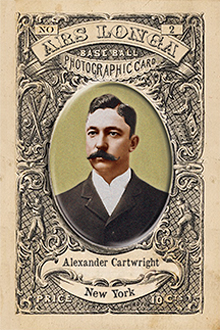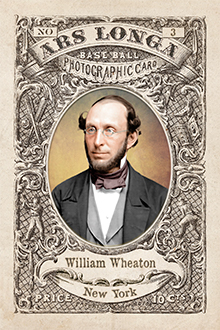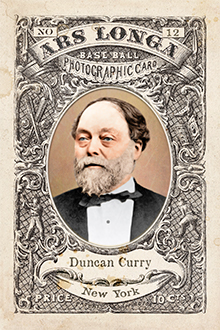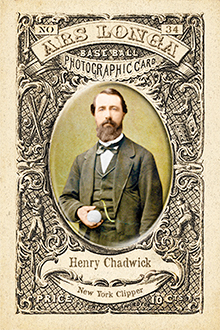- Series: Pioneer Portraits I: 1850-1874
- City: New York
- Team: Knickerbockers
- Hall: National Baseball Hall of Fame
This is not an image of Alexander Cartwright. Somewhere in the photographic archives of the State of Hawaii, they had tagged this photo as that of Alexander Cartwright from his time living in that great State. Again, Mark Fimoff of SABR identified my mistake and was kind enough to alert me to it.
I made and released this card twice, both in 2013.
- Series: Pioneer Portraits I: 1850-1874
- City: New York
- Team: Knickerbockers
William Wheaton (1814-1888) was an early pioneer of the new game of “base ball.” He was an officer in the Knickerbocker Club and served on its rules committee. According to his own account he may have been the first to codify rules of the game, for the Gotham Base Ball Club in 1837.
- Took time from his law practice to play the new game with business associates
- Received a federal appointment from President Grant, 1876-86
- In ‘87 bemoaned the fast pace of life compared to the days he could while away on the diamond
- John Thorn, official historian of MLB, champions Wheaton as the true “father of baseball”
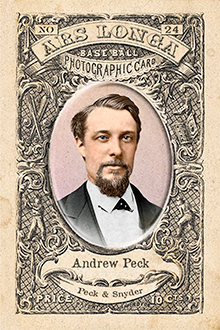
- Series: Pioneer Portraits I: 1850-1874
- City: New York
Andrew Peck (1836-1918) and his partner Walter Irving Snyder founded the first true sporting goods store in 1866 at 124-128 Nassau Street in New York City. The pair wanted to promote their business and thought trade cards might help. In 1869, this was a common technique for many retailers, but Peck and Snyder wanted something distinctive. They came up with the idea of using the image of Harry Wright’s nationally renowned new professional baseball squad, the Cincinnati Red Stockings, as their motif. A few versions were printed, the most prized of which today features the players in uniform and their names below the photo. No one could have known that this modest marketing scheme would pave the way for one of the great products and hobbies in American history, as Peck and Snyder unwittingly established a framework for the mass-produced baseball picture card. Following the Red Stockings release, the company issued cards featuring the hometown Mutuals and rival Chicago White Stockings in 1870. Other manufacturers soon followed suit and baseball cards became an advertising mainstay.
- Peck posted inning-by-inning telegraph reports of the big game between the NY Mutuals and Wright’s club in 1870 to a fevered crowd of NY “cranks.” Final tally: Cincinnati 15, NY 12.
- Peck started his business with ten cents to his name and died a rich man
- Perhaps not rich enough to buy his own trade cards today though: a Peck & Snyder 1869 Cincinnati Red Stockings card recently sold for $75,000
- Series: Pioneer Portraits I: 1850-1874
- City: New York
- Team: Knickerbockers
Duncan Curry (1812-1894) is one of a group of illustrious founders of the Grand Old Game. Several have been put forward as the true “Father of Baseball” and Curry’s claim is as sturdy as any. A founder of the Knickerbocker Club (a requisite for paternity), Curry was an integral part of the beginnings of the game, including participation in the “first” game: in Hoboken NJ June 19, 1846.
- The NJ interlopers destroyed the Knickerbockers in that game 23-1
- Curry blamed the loss on overconfidence and an opposing pitcher with blinding speed
- In 1856 Curry’s preferred seven-inning format lost out to Louis Wadsworth’s nine, signaling the transition of the game’s growth out of the hands of the founding Knickerbockers
- Series: Pioneer Portraits I: 1850-1874
- City: New York
- Hall: National Baseball Hall of Fame
Henry Chadwick (1824-1908) is widely considered the “Father of Baseball” due to his profound influence on early public awareness of the game and upon its foundational rules. A journalist from Brooklyn, Chadwick was present at the creation as he saw the new game developing in the 1860s and began what would become sports reporting today.
- Literally wrote the book on baseball: Beadle’s Dime Base Ball Player in 1860
- Edited Spalding’s Official Base Ball Guide for decades
- Saw to it we don’t have tie games or one-bounce outfield put-outs today
- Elected to Hall of Fame: 1938
